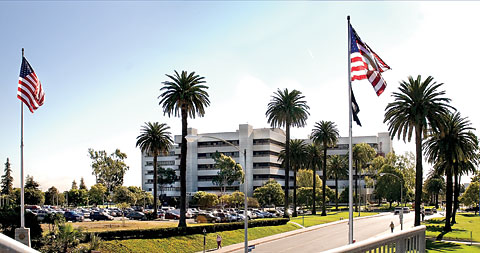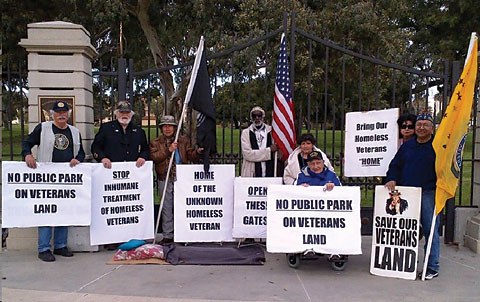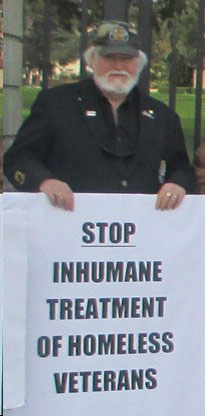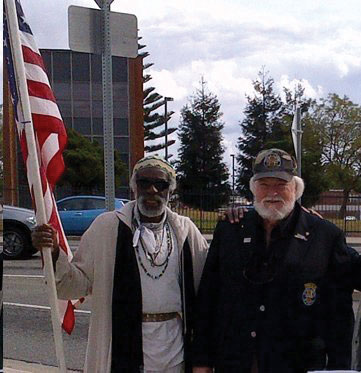 |
|||||||||
|
March/April 2014 A Situation On Knife’s Edge
BY PAUL ROGERS A long-running, deeply contentious dispute between the U.S. Department of Veterans Affairs and veterans advocates over the leasing of portions of the VA’s sprawling West Los Angeles campus flared up again last August when a federal judge struck down commercial leases on the property. While U.S. District Judge S. James Otero’s decision was, on paper, a win for veterans and the American Civil Liberties Union, which brought the lawsuit in 2011, Otero put his ruling on hold for six months to give the VA the chance to appeal. UCLA, which leases land for its baseball stadium from the West Los Angeles VA, and Brentwood School, which rents twenty-one acres for sports facilities, also appealed Otero’s decision. That means that nothing has changed on the ground, and the future of the West Los Angeles VA remains in limbo. The leasing issue has its roots in the original land grant deed signed in 1888, when wealthy local landowner Arcadia Bandini de Stearns Baker bestowed the property on the U.S. government “to be permanently maintained as a National Home for Disabled Volunteer Soldiers.” At the time thousands of disabled veterans of the Civil War and Indian Wars were in desperate need of housing and treatment. Baker’s rural six hundred acres, stranded between the nascent city of Los Angeles and the Pacific Ocean, was then commercially insignificant. The gift was a purely humanitarian, apolitical gesture. But within decades Los Angeles rapidly expanded toward the ocean and the property was bisected first by Wilshire Boulevard and then by Interstate 405. By the turn of the 1980s its remaining 387 acres were surrounded by some of the most coveted and pricey real estate in the country: Bel-Air to the north, Westwood to the east, and Brentwood to the west. Many non-veteran entities greedily eyed its acreage. Land use soon became a political hot potato and has remained so. While a 1988 law stipulated that the land could never be sold, several outside parties have leased portions of the property. For example, UCLA has rented land for its 1,820-capacity Jackie Robinson Stadium since 1981, and a twenty-year lease was signed with the exclusive Brentwood School in 2001. Other lessees have included a hotel laundry service, a rental car operation, movie set storage lots, a dog park, and a television studio. The online journal Veterans Today has described the situation as “the biggest land-fraud scandal in American history.” The VA’s practice of generating revenue by leasing portions of its West LA property—which includes the VA’s West Los Angeles Medical Center, the 114-acre Los Angeles National Cemetery, and the Wilshire Federal Building, as well as many unused buildings and acres—has pitted the department, wealthy local landowners, and commercial interests against veterans and their advocates. The latter point out that, with thousands of homeless veterans still on LA’s streets (6,300 as of last January), the land should, as designated in its original deed, be devoted to housing needy vets. So long as the VA’s largest campus sits amid the nation’s most sizeable population of homeless veterans, they argue, none of the land should be used for anything other than the care of needy former service members. Vietnam Veterans of America is a major plaintiff in the ACLU of Southern California’s class action lawsuit against VA Secretary Eric Shinseki and VA Greater Los Angeles Healthcare System Director Donna M. Beiter on behalf of homeless veterans with severe disabilities. The suit contends that “the VA’s benefits program discriminates against veterans who are homeless as a result of their severe mental disabilities because they cannot access the medical, mental health, and other services to which they are entitled.” While Judge Otero sided with veterans—giving VA tenants six months to either appeal his decision or terminate their leases and prohibiting the VA from leasing land to private parties “totally divorced from the provision of healthcare”—his ruling doesn’t compel the VA to use more of the land to house homeless and ailing former servicemen and women, as the ACLU-VVA lawsuit had sought.
“You never know about court cases, especially when they get up into the appeals and start going to the higher courts,” said Steve Mackey, VVA’s California State Council president. “I don’t see the leasing situation changing too soon. I think it will stay the way it is right now for quite a while.” Other veterans expressed guarded optimism that Otero’s rulings have at a minimum some moral significance. “We have at least a ruling that says you’ve got to honor the lease, and it gives veterans and those folks who are concerned citizens some support in believing that we can fight this,” said James Maddox, the former president of VVA Chapter 446 in Pasadena. That fight is certainly continuing—and not only at a local level. On Super Bowl Sunday VVA National President John Rowan joined Robert Rosebrock and other members and supporters of the Old Veterans Guard outside the VA campus for the 307th consecutive Sunday Rally of the Veterans Revolution To Save Our Veterans Land. “It’s strictly a matter of us supporting our veterans in the field,” Rowan said. “It’s kind of a unique situation at the LA hospital, because of the old deed that granted that it only be used for veterans. We support [veterans advocates’] efforts to create more programs for the homeless, even though there’s quite a number on the campus.” Ironically, even some the most vocal veterans advocates don’t object to the VA leasing portions of the West LA campus to raise revenue to be used to develop other parts of the campus—for example, to refurbish some of the property’s unused buildings or to better care for homeless and disabled veterans. There’s an acceptance that, with the property being so huge, it is unrealistic to expect every inch to be used for veterans care. Many in the veterans’ community have no problem with leasing portions of it to bring in money that can be used toward the care of veterans in need.
“I’m fine with [the leasing], as long as they use that money for veterans’ care,” said Mackey, who served as a door gunner and crew chief in Vietnam in 1970-71. “In the past, nobody’s known where that money’s gone. We’ve had a couple of people try to find out, but they won’t tell them anything.” A UCLA spokesman has said that the university has paid $600,000 to rent the land for its baseball diamond. Brentwood School has said that it has paid $4.5 million to the VA in rent since the mid-1990s. “OK, fine, where’s the money?” Maddox asked. “They won’t let you see the money. Congressmen have tried to get the accounting, and we’ve tried it under a Freedom of Information Act inquiry, and we still can’t find out.” There’s also the question of whether lessees are paying fair market value for such desirable property. “The leases probably are too thin,” said Maddox, who served in U.S. Army Intelligence in Vietnam in 1970-72. “They should charge more money for them.”
“We have no idea where the money goes,” said Rowan. “And we’re very concerned about that.” The VA’s refusal to open its West Los Angeles books to its critics fogs the entire land-use disagreement. In a worst case scenario, Otero’s ruling could deprive the VA of considerable annual income without guaranteeing that the vacated leases would be used for veterans’ care. But, as no one outside of the VA has any idea of how (or even if) that revenue is spent, it is impossible to gauge the impact of this outcome on needy vets. If income from the current leases isn’t furthering the care of veterans, then why violate the 1888 deed at all? “The VA could be putting revenue from leases into a general fund that could be spent anywhere,” Mackey said. “But if they’re leasing the land here, the money should be staying here and should be doing something to upgrade all those buildings they have so they can start taking care of some of the homeless people and some of the disabled out there.”
While some of the lessees contend that they contribute to veterans’ care by providing facilities that are occasionally available for veterans’ enjoyment, both Mackey and Maddox shoot that down as mere window dressing. “They call it the Veterans Park, there in the front of that great big lawn,” Mackey said. “But if veterans go on the property to sit down or something, before long the police are over there questioning them on what they’re doing, asking them to leave. What kind of veterans property is that?” The athletic complex leased by tony Brentwood School is off-limits to veterans. “If Steve Mackey and I decide to go over there on Sunday morning and try to hop the fence, our next stop will be the Los Angeles Police Department Pacific Palisades lock-up,” laughed Maddox. And it’s hard to imagine how private storage and parking lots could possibly be of direct benefit to disabled veterans. Even if appeals against Otero’s ruling are successful, there probably won’t be more leases. “I don’t think the VA would want all the publicity—all the negative publicity—if they started leasing more of the property,” Mackey said. So while the status quo seems set to prevail in the short term, and the lawsuit has at least stemmed the leasing tide, the situation remains on a knife-edge. “If veterans and concerned citizens don’t keep the pressure on UCLA, the VA, and their congressman, then UCLA and Brentwood and the Veterans Park Conservancy will prevail,” warned Maddox. “They have strong friends. They have friends in high places. They have bigger lawyers, and they’re going to apply pressure on the judge.” “This is an issue that is not political,” he said. “This is just wrong. This is a moral argument.”
|
|||||||||
|
|
|||||||||
8719 Colesville Road, Suite 100, Silver Spring. MD 20910 | www.vva.org | contact us |
|||||||||











 While such leases might defy the most literal interpretation of the original deed’s stipulation, they at least become a resource for the care of disabled veterans. The VA’s refusal to make its lease accounts available for scrutiny has largely fueled the ire of veterans and their supporters.
While such leases might defy the most literal interpretation of the original deed’s stipulation, they at least become a resource for the care of disabled veterans. The VA’s refusal to make its lease accounts available for scrutiny has largely fueled the ire of veterans and their supporters. Before writing this article, we requested information regarding revenue from the leases and how it has been spent. Although the department’s FOIA officer and a public affairs specialist responded to emails, no data was provided.
Before writing this article, we requested information regarding revenue from the leases and how it has been spent. Although the department’s FOIA officer and a public affairs specialist responded to emails, no data was provided.